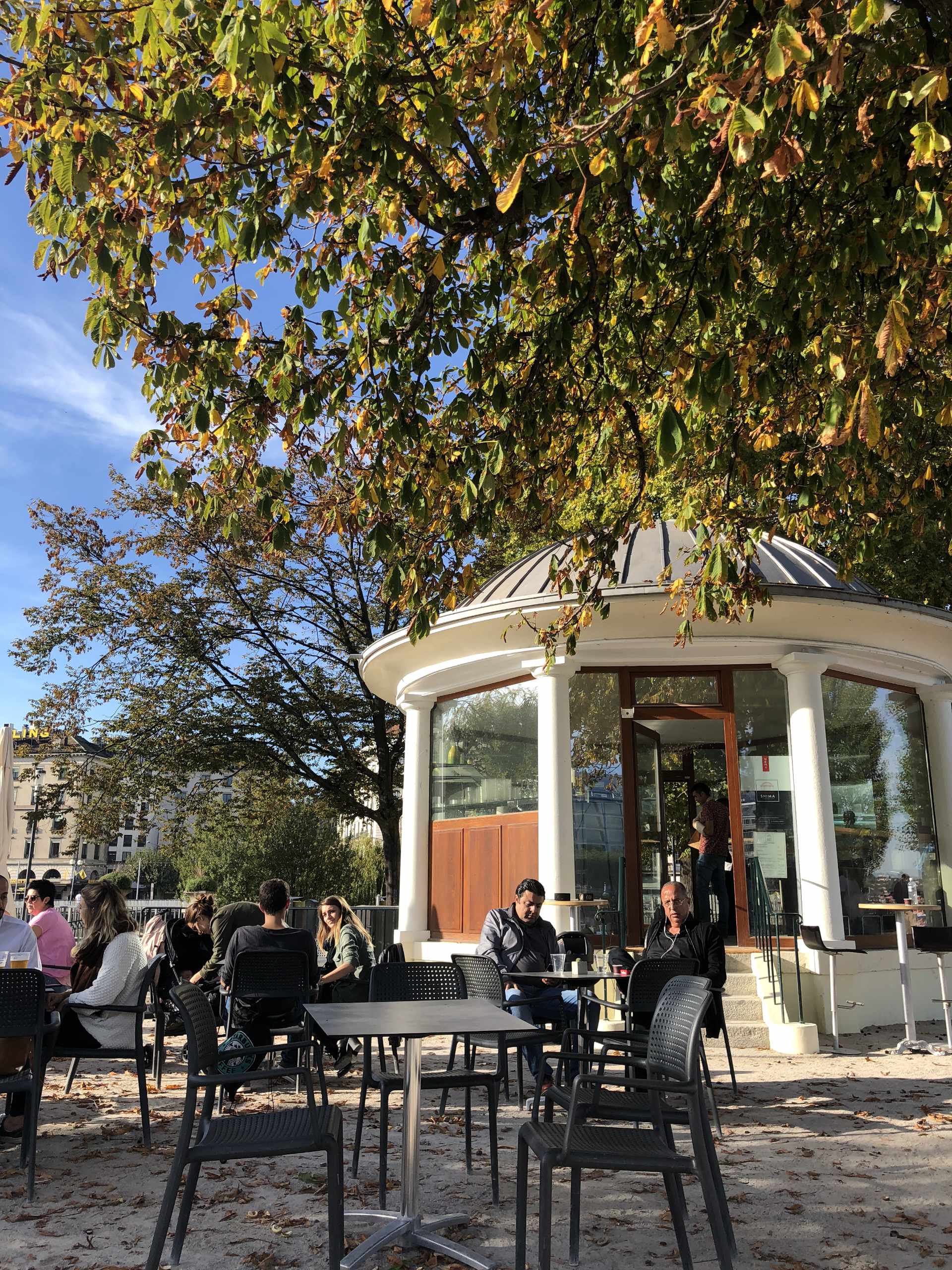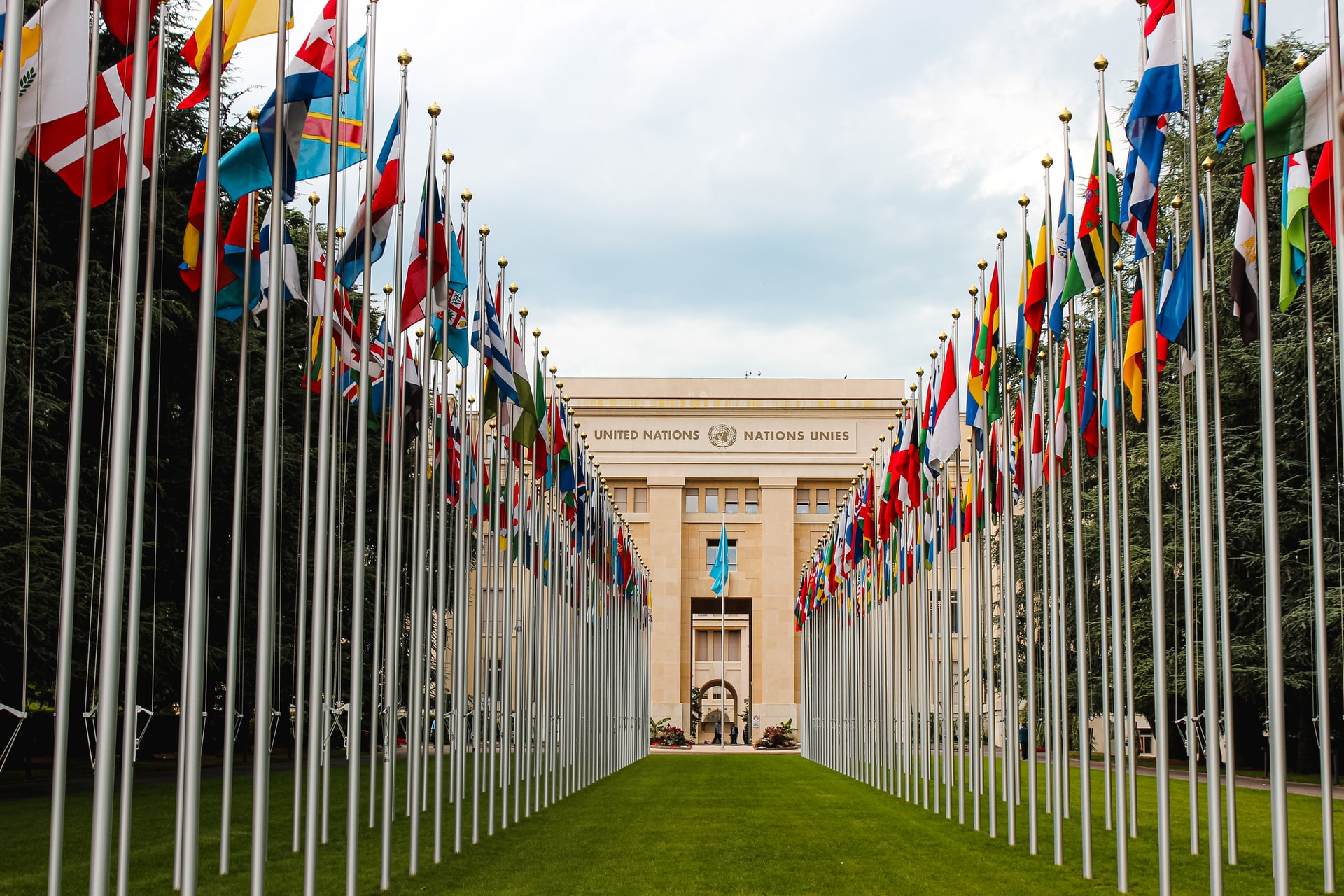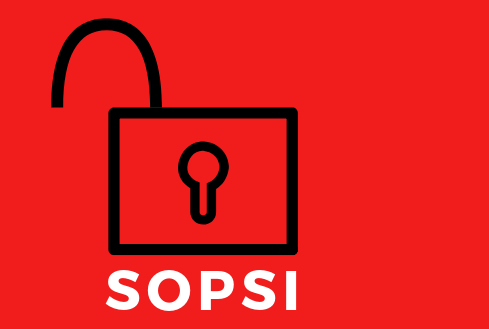
On the path to transparent and reproducible science: Swiss Open Psychological Science Initiative (SOPSI)
The importance of open science has become more and more salient in the past few years. Prof. Evie Vergauwe and Dr Alessandra Souza have contributed to this field in their project Swiss Open Psychological Science Initiative (SOPSI) by providing an opportunity to train young researchers in a sustainable way and to create a culture of open, collaborative science among Swiss-based psychologists.
Fostering open science and reproducibility
Despite the ongoing efforts to promote open science in Switzerland, Prof. Evie Vergauwe and Dr Alessandra Souza are convinced there is room for more, especially when comparing Switzerland to other countries such as the Netherlands or the UK that have been pushing continuously in this field. Both researchers took the opportunity of the seed funding scheme within the UNIGE-UZH strategic partnership to promote open science in their field.
With the aim to understand the current situation at the University of Geneva as well as the University of Zurich, but also more broadly within the Swiss landscape with regards to open science and reproducibility, Prof. Evie Vergauwe and Dr Alessandra Souza created a survey which was directed at all universities. This, in turn, gave an understanding of “what people thought concerning open science and what were their wishes with regards to training in this area”, agree both.
Equipped with this understanding, Prof. Vergauwe and Dr Souza planned and organised two workshops, in Zurich and Geneva, that targeted the areas mentioned in the survey, such as Bayesian statistics, preregistration, and open data and open materials.

Although the workshops were primarily targeted at psychology, there were attendees from other fields as well. “Open Science needs to be an integrated part of the university and what we teach,” says Dr Souza. Given the interest and success of the workshops, “events like this could happen about every second year or so to keep up the progress and assess and learn how people are actually incorporating the practices into their research lifecycles,” remarks Prof. Vergauwe.
Moreover, the workshop brought forward other aspects as well, and included university staff not strictly limited to researchers: members of ethics committees, librarians, and data protection specialists. Different participants involved have different viewpoints on the same topic. With regards to the open data and data protection, for example, room was created to discuss and see the challenges the different actors face in their work and “fostered understanding between each other,” acknowledges Prof. Vergauwe.
The multiplier effect
Joining forces between the two universities and organising the events together made the workshops not only a university affair but more profoundly a Swiss endeavour. This created a wider interest, made it more attractive and its impact even bigger.
“the impact would have been much smaller if we would have done it just within one university” – Dr Alessandra Souza
More broadly, collaborating within the strategic partnership between UNIGE and UZH facilitated the work together, be it in terms of infrastructure or organisation of the events, as it could be directed at the specific culture and departments, in order to bring people together and create a network that could support each other.
These events have, moreover, catalysed further projects. With the support of Prof. Vergauwe, the Swiss Reproducibility Network was created together with Prof. Leonhard Held (University of Zürich) and Prof. Hanno Würbel (University of Bern), similar to the reproducibility network in the UK. The goal of this network is similar to that of SOPSI: to foster open science, better and reproducible science, but in a more interdisciplinary manner, involving different universities as well as different fields. With this in mind, the aim is to create international networks. Portugal, for instance, is a country working eagerly to this pursuit, now also with the efforts of Dr Souza who is currently a researcher at the University of Porto. She has been working to foster open science in her current department as well as creating a similar national Portuguese network. She will also represent Portugal in the European Summit which will take place in Bern, Switzerland in September 2021.
Both Dr Souza and Prof. Vergauwe are keen to encourage other countries to create similar networks with the goal of fostering Open Science and reproducibility networks not only in the field of psychology, but also with a more transversal and diverse approach.
Find out more about the work of the researchers:
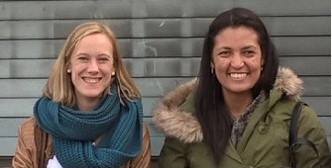

Finding housing during the exchange: some practical tips
Discovering a new city is an exciting experience. But finding a place to stay in Zurich as well as in Geneva can be a little strenuous when it comes to an exchange. Previous exchange students agree to this and share their pieces of advice, which may be helpful to future students aspiring an exchange.
GENEVA
Since the range of accommodation in Geneva is limited, it can be difficult to find a suitable home for the stay. Teresa and Kaja both agree. They suggest that starting early when looking for accommodation is key. One option that worked not only for Teresa was to look for apartments on the other side of the border, in neighbouring France, where she found a small apartment in Annemasse, near Geneva. There is a bus to Geneva every 15 minutes and the town offers everything you need for your daily needs. Furthermore, the living costs are much lower compared to Geneva itself. Kaja succeeded through personal contacts and found a nice and welcoming host family through old acquaintances.
“It is worthwhile to start early and to ask around through personal contacts” – Kaja
Other than that, of course the University of Geneva offers a list of possible accommodation. Here, too, starting early could make the difference. It should be noted though that the Bureau des logements de l’Université (BLOG) responds just shortly before the semester starts, and can therefore be a last-minute option if the search has not yet been successful, suggests Sophia, provided that the registration has been made as early as possible.
At last, staying for a short period of 3-4 months, could sometimes make the accommodation hunting more difficult, as Sirina points out, but she found a flat through Airbnb which was “ultimately very good.”
ZURICH
For Zurich, timing seems to be of importance as well. One needs to plan ahead, but too early could be unfruitful as well, says Vanina. Also, sometimes there can be a real selection process to go through during or after the viewing, so travel may be required once in a while. Both Charlotte and Vanina suggest WOKO, which is a student’s cooperative for accommodation, as a good starting point. Other than that, the UZH housing suggestion could be a helpful as well.
Although housing in the city centre is rather expensive, it is more affordable in the surrounding areas such as Oerlikon. WG Zimmer, a website for renting rooms, provides another option, says Estelle, but also social networks, personal contacts and friends’ networks may be helpful in finding a suitable place to stay in Zurich.
“You have to be patient and try everywhere.” – Estelle
On a more important note
In most cases, it may be required to announce your arrival to the authorities, as well as your departure from the canton of origin – make sure to check the formalities! Changing cantons or countries has specific procedures to follow.
Beware of scams on the internet! Never pay for accommodation or a visit in advance without having seen it or the person responsible, and without having a signed contract. For more information, please refer to the following page from the Vaud Police.
Picture credit for the header: Adrian Trinkaus

Culture and leisure during the exchange: some suggestions
On these maps you can find suggestions about some of the favorite places by other exchange students to enjoy the city. Moreover, get an insight of their experience.

Geneva 
Zurich
ZURICH
Be it student life, foodtrucks or even Christmas market, Vanina and Charlotte are convinced there is plenty of things to discover in and around Zurich. In terms of sports, the ASVZ offers physical activities to suit all tastes!
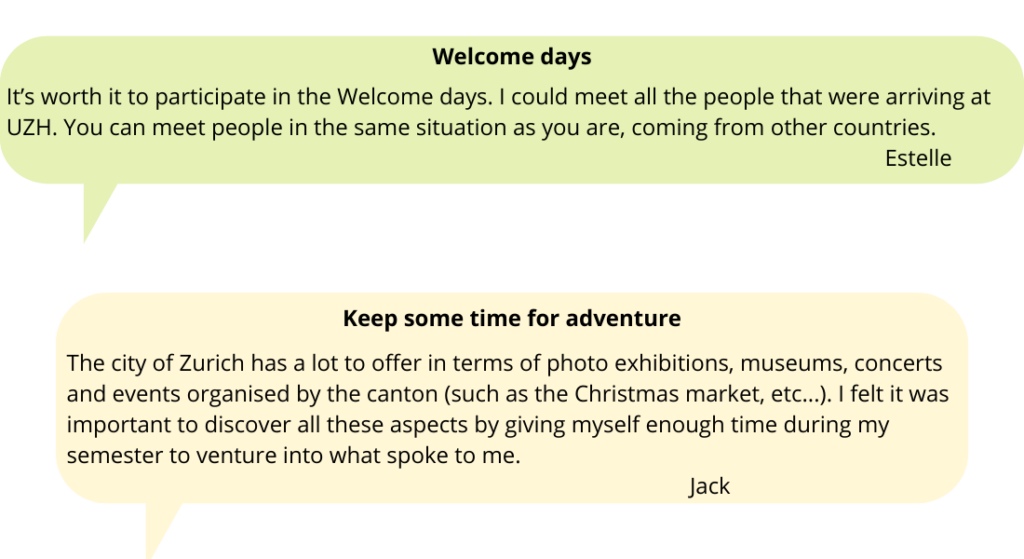
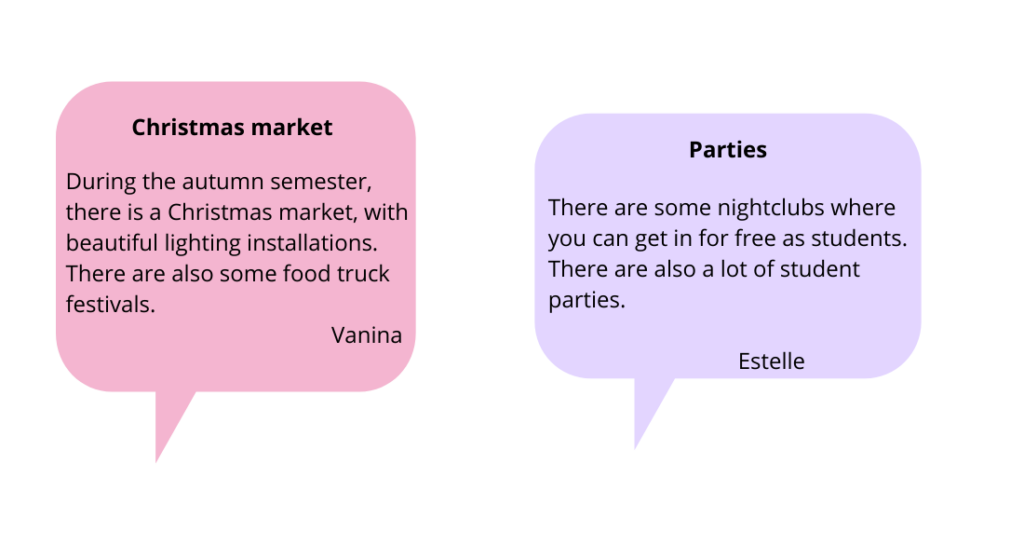
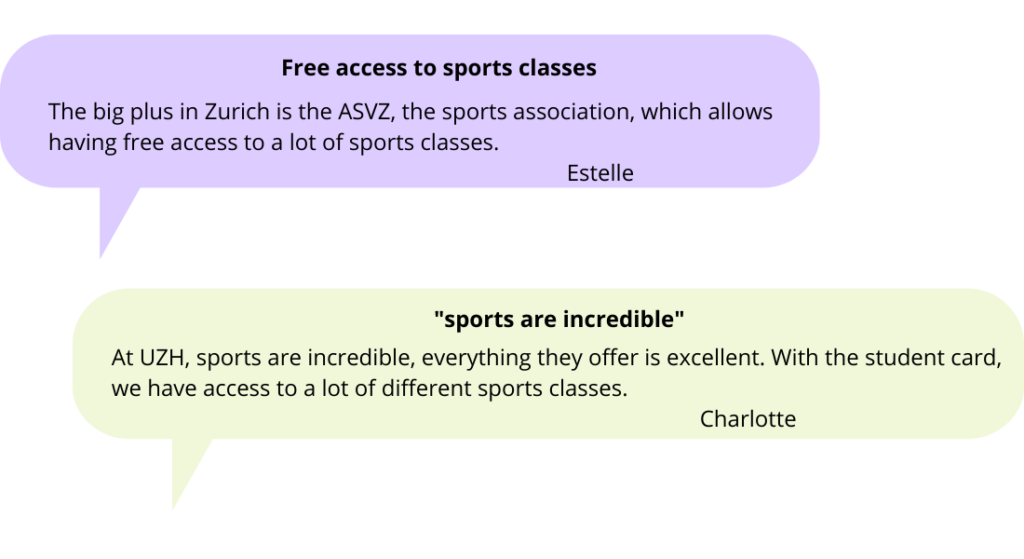
GENEVA
The city itself invites you to explore and offers sightseeing opportunities with its beautiful old town, countless museums and of course the European headquarters of the UN, says Elsa. Concerning physical activities, the UNIGE also offers some great opportunities.
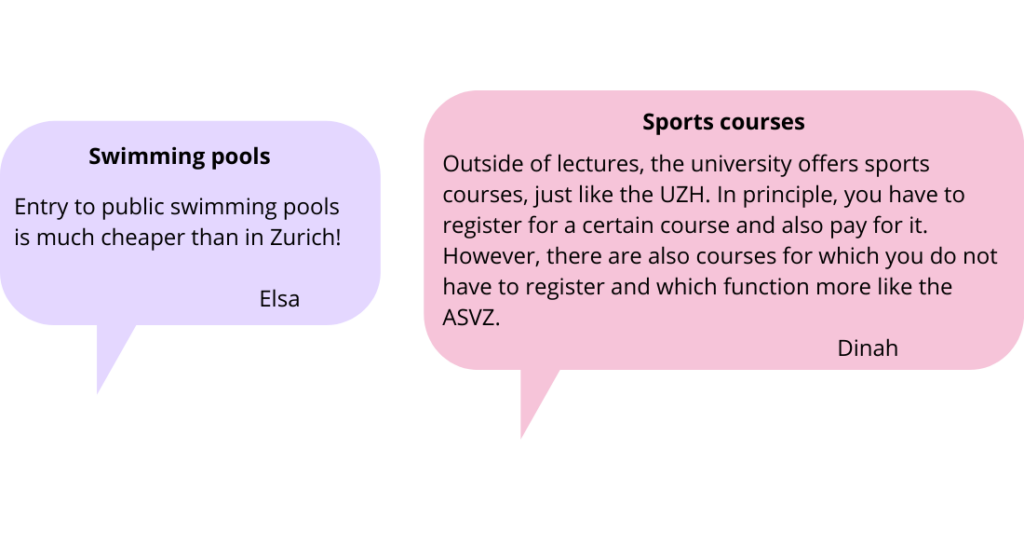
Picture credit for the header: Serhat Beyazkaya
Picture credits for article, first row: Ricardo Gomez, Nirmal Rajendharkumar
Picture credits for article middle row: Dorothea Oldani, Arie Wubben, Claudio Schwarz
Picture credits for article, last row: Nguyen Kim (1,2), Mathias Reding
WEF 2020
During the World Economic Forum Annual Meeting 2020 in Davos, the University of Zurich and the University of Geneva jointly presented two innovative projects. The Swiss Data Cube delivers a unique near real-time capability to track various environmental changes and provides an innovative technology to ensure environmental protection, assess risks or document progress in sustainability policy. For its part, acceleRare is a public-private-patient partnership aiming to bring together existing resources and researchers on rare diseases to develop new drugs and therapies.
Swiss Data Cube
The project was presented during an event organized by the House of Switzerland in Davos on 23 January 2020, by Gregory Giuliani, senior lecturer and head of Digital Earth Unit and Swiss Data Cube project leader at GRID-Geneva, UNIGE Institute of Environmental Science (ISE), and Michael Schaepman, professor at the UZH Department of Geography and now President of the University of Zurich.
The project is part of a collaboration agreed in 2019 between the University of Zurich, University of Geneva, the Swiss Federal Institute for Forest, Snow and Landscape Research (WSL) and UNEP/GRID-Geneva – with the aim of using Earth observation data to strengthen national environmental monitoring. The SDC collects all available data from the American Landsat programme and the European satellite series Sentinel 1 and 2 since 1984 to present.

SDC technology provides access to data visualization of the satellite images. This access significantly improves the way users can interact with the data and simplifies the use of the satellite pictures. The added value of this technology is that the most relevant data for Switzerland is selected, gathered in one place, and its accessibility guaranteed in the longer term. The aim is to keep the data as approachable as possible, also without specialist knowledge.
According to Giuliani, “The Swiss Data Cube is an ideal tool to monitor the global sustainable development goals in terms of climate change, water quality, urbanisation or biodiversity and to document them for Switzerland.” And Michael Schaepmann is convinced that “the climate issue cannot be denied. We have to draw attention to it and show that we can make a difference with modern technology.”
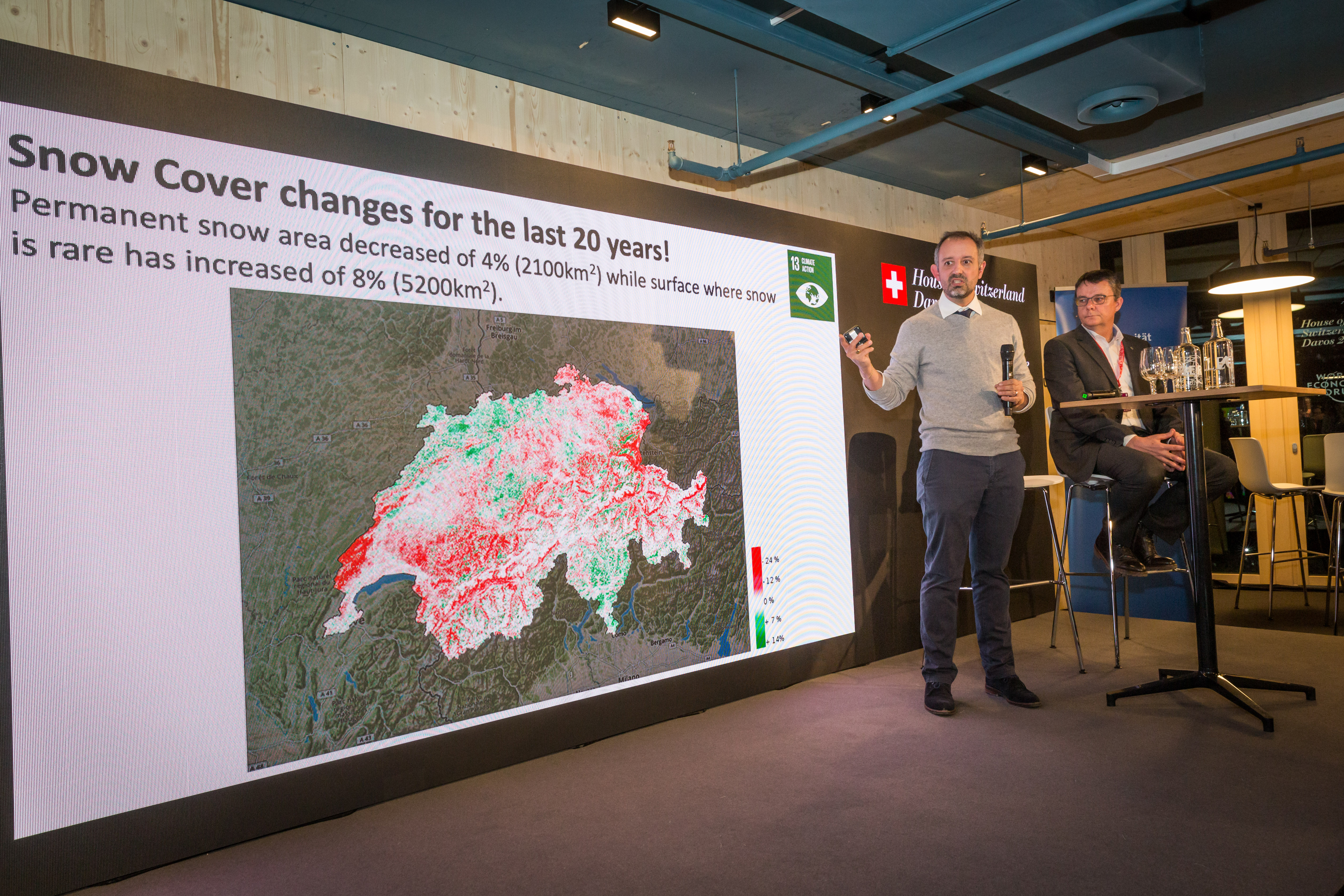
Not only does the SDC gather data but more so can provide information for policy recommendations, spatial planning and environmental assessments. It is hoped that this technology will foster cooperation, ideas and projects and strengthen expertise at national and international level which yields possibilities to compare the results and make better predictions on the development of biodiversity.
AcceleRare
The project AcceleRare, which seeks to combine efforts to create new treatments for rare diseases, was introduced in the framework of a high-level luncheon taking place during the Annual Meeting in Davos. The project was presented by Leonardo Scapozza, professor and head of Pharmaceutical Biochemistry/Chemistry at the UNIGE, along with Jonathan Hall, professor and head of Pharmaceutical Chemistry at the ETH Zurich and Olivier Devuyst, professor and head of Mechanisms of inherited kidney disorders group at the UZH. The presentation showed how this project could inspire national and international stakeholders to come together in order to offer a brighter future to those affected by rare diseases.

The researchers based their approach on the observation that threat caused by rare diseases, affecting around half a million people in Switzerland, is often underestimated. As a consequence, resources and researchers are spread out. To encourage joint efforts, the researchers aim to create a research platform about rare diseases. The objective is to foster collaboration between different important stakeholders such as patient advocacy groups, scholars and the pharmaceutical industry.
Read more about it
UNIGE
https://www.unige.ch/internationalrelations/en/iosngos/pre/events/wef-davos-summit/
UZH
https://www.news.uzh.ch/de/articles/2020/UZH-am-WEF.html
https://www.media.uzh.ch/de/medienmitteilungen/2019/Schweizer-Data-Cube.html
Picture credit for the header: Evangeline Shaw
Picture credit for the article, from top to bottom: Monique Aravantes, Sébastien Crettaz, Michael Longmire

Six newly funded projects: resilient societies as a common mission
The global health crisis caused by the Covid-19 pandemic has unveiled the fragility of our societies and ecosystems. Resilience has therefore become the new grounded rule for all countries. Indeed, the current pandemic reaffirms the crucial need to prepare societies for future shocks, all sectors combined. To contribute to this general effort, the UZH-UNIGE strategic partnership launched a call for project on the following topic: Shaping Resilient and Responsive Societies and Ecosystems in View of Global Crises. In February 2021, out of nine proposals received, six projects were selected for funding.
Despite its long-lasting consequences, the Covid-19 pandemic has also opened windows for new opportunities and transversal collaborations. Bringing together in total 32 experts from both universities as well as from other public and private institutions, the six projects will tackle the lessons learned and the question of global crises and resilience through different lenses. With research topics as diverse as integrated risk management, global health law and human rights, historical comparisons, science communication, or the use of data in managing a global crisis, the researchers will work on further conceptualizing resilience and developing innovative tools for shaping more resilient and responsive societies.
What follows are short summaries of these projects, the full descriptions of which are available here.
Lessons from the past: Quantifying pandemic spread and public health interventions during the first three global influenza pandemics in Switzerland 1889, 1918 and 1957
Principal Investigators: Kaspar Staub (UZH), Olivia Keiser (UNIGE)
The global outbreak of the Covid-19 has put societies and their public health systems through trials. To strengthen the resilience and in order to adapt for similar future challenges, learning from the past pandemics (and their management) is crucial.

In this project, the team will be quantifying the experiences of past pandemics in Switzerland, especially concerning the outbreaks in the years of 1889, 1957 and 1918. The scholars hypothesize that “the patterns of pandemic spread, its determinants, and effects of public health interventions are similar across pandemics”. The main goal of the project is to use epidemiological methods in order to reconstruct and relate the temporal and regional spread of the above-mentioned pandemic outbreaks based on incidence and mortality data, and to investigate the factors influencing the spread and the change in epidemic course associated with public health interventions. By doing so, the team hopes to provide a channel and access to the past experiences of pandemics, more importantly for the public and policy makers, who play an important role in the fight against pandemics.
PRECHEK: a checklist to evaluate COVID-19 preprints
Principal Investigators: Evie Vergauwe (UNIGE), Leonhard Held (UZH)
The Covid-19 pandemic has shown an exponential growth of preprints. Preprints encompass works that have not been peer reviewed. They have gained popularity in the past decade as preprint platforms facilitate a fast sharing of the work, interaction and enhance discussions on social media. However, since these preprints are not peer reviewed and have not undergone a process of vetting, their premature use by the press could bear also some danger of misinformation.

The researchers, therefore, aim to provide a clear and understandable guidance in the form of trainings to students and university press officers and of a checklist to evaluate the quality and credibility of a preprint. PRECHECK provides valuable insights and trainings in a time where trustworthiness of science is at stake. In the midst of rapid digitalization, information overload and a global health crisis, where time is of essence, the project aims to prepare future scientists by focusing on the youngest members of the academic community.
Integrated Risk Assessment and Management
Principal Investigators: Maria J. Santos (UZH), Markus Stoffel (UNIGE)
The Covid-19 pandemic has led to the opportunity to reflect on the prevention of future interconnected shocks originated, in particular, from health, biodiversity and climate. To prepare societies for those future interconnected crises and to build resilience, the 10 experts from both universities, but also from the World Economic Forum and the Swiss Federal Council for the 2030 Agenda, strive to update the Integrated Risk Assessment and Management (IRAM2.0). More specifically, the experts seek to discover the drivers, stressors and vulnerabilities in the health, biodiversity and climate systems. They will look at how those elements have acted individually and concurrently in the Covid-19 pandemic. The research also seeks to highlight the co-benefits that could emerge with the adoption of IRAM measures as well as the kind of data and actions needed for its implementation. Ultimately, the experts will contribute to improving social capabilities that we need in order to live with different types of shocks as well as to implement rapid responses.

To this end, the experts will take up some outputs that emerged during the Expert Meeting that took place on 12 November 2020, more particularly from the thinking group sustainability. To attain their objectives, they will work closely with the public, academic and private stakeholders to design a citizen science and communication platform and thus facilitate information sharing and stakeholder’s involvement.
Gobal health law, ethics and human rights for resilient societies
Principal Investigators: Stéphanie Dagron (UNIGE), Nikola Biller-Andorno (UZH)
Despite evaluations and development of national epidemic preparedness, many countries have done worse than expected during the Covid-19 pandemic. Given this, the project seeks to create knowledge in two different areas of improvements based on a human rights and global ethics health approach. Given the observation that the pandemic has illustrated the susceptibility of poor and vulnerable populations to disaster, the project will firstly focus on national health systems and preparedness of societies to shocks. The second area concerns the global level and the improvement of international collaboration through the development and/or reform of legal instruments and of governance structures in global health.

More specifically, the project will tackle several overarching questions. The latter include the will to identify what human rights are breached during a pandemic. The researchers also seek to study how solidarity and protection of vulnerable populations can be enhanced. Finally, the project aims to determine what legal or ethical resources are needed to enlarge duty bearers to non-traditional partnerships for multi-level governance.
Building Socio- Economic Resilience to Global Shocks
Principal Investigators: Ralph Ossa (UZH), Salvatore di Falco (UNIGE)
Inspired by the kick-off meeting of the expert dialogue on “Shaping Resilient Societies” (12 November 2020), the researchers of this group will engage with questions concerning the economy and the lessons learned within the context of socio-economic resilience. Indeed, when the eminent health is contained, the focus will inevitably shift to these concerns.

To do so, the team will lay a foundation by clarifying the meaning of socio-economic resilience and its importance for policies. The scholars will then identify and collect the heterogenous effects of the pandemic and which groups were specifically resilient to it and if these differences have led to changes in socio-economic inequalities. At last, they will determine towards which particular disruptions more resilience is needed. The principle aim of the project is to compile a policy brief and explanatory notes, resulting from aggregated existing knowledge and original research, accessible for policymakers, other stakeholders in policymaking but also journalists and interested public.
Governance Mechanisms for Access and Use of Data in Public Health Crises
Principal Investigators: Jacques de Werra (UNIGE), Florent Thouvenin (UZH)
The obstacles of access to valuable data are relatively high, even in times of public health crises. To reduce these hindrances, the team identifies three barriers (cultural, infrastructural, legal) which restrain the access and use of data and suggest three future solutions (Data Literacy, interoperability, rethinking data protection law) to facilitate accessibility.

Acknowledging the importance of privacy, the scholars argue that the outlook towards personal data in the society should be reconsidered, since it can serve as a valuable resource and foster innovation and development of society on many levels. Moreover, they emphasize that sharing data and privacy protection are not mutually exclusive. The infrastructure must also be adjusted and enhanced in order to respond in the right way. For this, the team put forward a differentiation between types of data, where some data can be shared on a regular basis and others only made available in emergency situations. Interoperability is key to enabling data sharing in this manner. Furthermore, the restrictive legal rules and lack of possibilities to attain data collected by businesses or government agencies impede progress. Therefore, a legal framework for accessing data would enable valuable insight that could help in a health crisis, for example.
To overcome these issues, the researchers suggest that society needs a greater ‘Data Literacy’, or the “ability to critically collect, manage, evaluate and use data”, that would allow an informed decision about the usage of data. Interoperability should be ensured through standards, so that different systems and formats can function without restraints. At last, the legal frameworks of data protection should be considered in a manner where a more comprehensive access to data is compatible with privacy protection.
Picture credit for the header: Janko Ferlic
Pictures credits for the article, from top to bottom: Trnava University – Annie Spratt – Pixabay – Aditya Romansa – Anne Nygard – Shahadat Rahman






